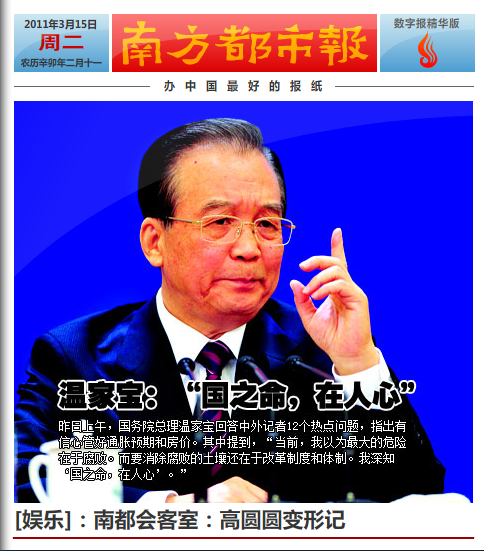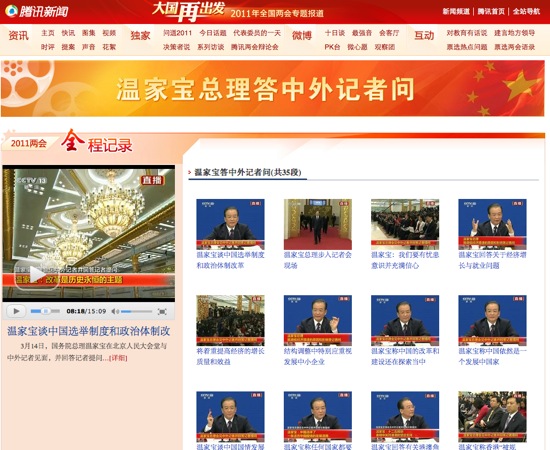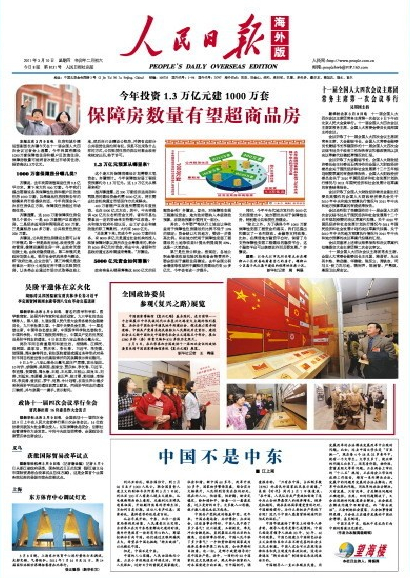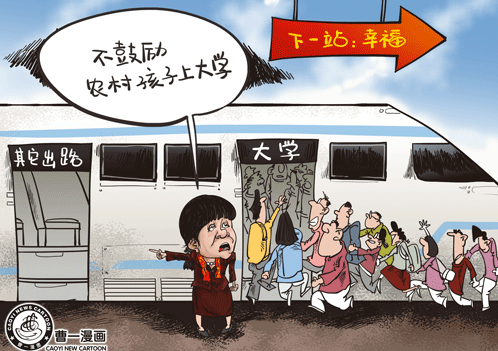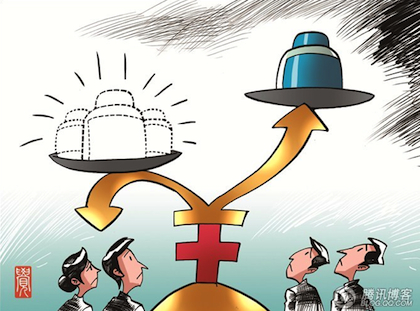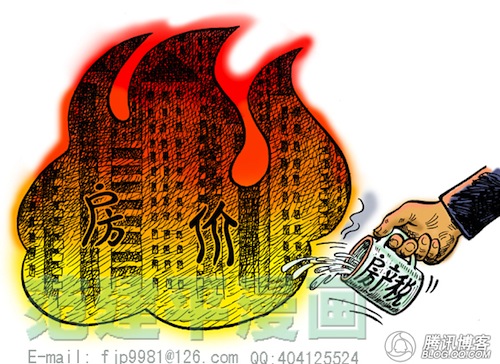As the annual National People’s Congress (NPC) opened last weekend, Premier Wen Jiabao (温家宝) urged the need to focus on the “accelerated transformation of [China’s] mode of economic growth . . . [to] ensure and improve the people’s well-being.” But the mechanics of exactly how to “transform” China’s economy involve touchier political reform issues that have pushed into the background at the NPC.
Premier Wen Jiabao’s government work report to the congress mentioned the buzzword “political system reforms,” or zhengzhi tizhi gaige (政治体制改革), just once, and in the context of a grocery list of other vague priorities in the “deepening of reform.”
What exactly is at stake here?
What are the social and economic issues that define this juncture in China’s development? A “crossroads” Wen Jiabao called it last year, when his attempts to bring political reform onto the open agenda met with determined resistance from Party hardliners. Many of these questions, and certainly many of potential answers, are still off limits for China’s mainstream news media. But this doesn’t mean the discussion is not happening at all.
The February 2011 issue of the journal Yanhuang Chunqiu (炎黄春秋), which is known for its open and sometimes daring discussion of history, politics and current affairs, ran a piece by Cai Dingjian (蔡定剑), a “giant among Chinese legal scholars,” who passed away in November 2010. In the piece, Cai wrote about the factors and policies that have shaped China’s economic development over the past thirty years and more.
Cai argued that the biggest factor driving China’s “economic miracle” since the early 1990s has been “the combination of money and power.” The underlying challenge behind many of the urgent social issues we have been hearing about during the National People’s Congress — housing costs, a widening wealth gap, rampant corruption — is now the de-coupling of money and power. And that, Cai Dingjian’s arguments suggest, simply cannot be done without political reform.
“This has been the honeymoon period of money and power,” Cai wrote. And how, his question unfolds, is China to continue its love affair with economic development?
Selected portions of Cai’s rather weighty piece follow:
After the disintegration of Eastern Europe, many people believed that China must not make an attempt at Western democracy, that it should learn from the lessons of the Soviet disintegration and ensure stability before all else. Without stability [the logic went], we can accomplish nothing. On the economic front we spoke of a few getting rich first. It was a social development policy of efficiency first, with due consideration to equality. We put all of our energies into developing the economy, Internationally, meanwhile, we took a policy of hiding our capacities and biding our time (韬光养晦).
What did the second phase of reform give to China? Economic development and increased wealth in society. During this second phase, every National Party Congress political report has talked also about political reform. But in fact we have seen no institutional arrangements. Our entire society has busied itself with economic development, and wealth has increased as a result. But our value system has essentially collapsed. The sense of credibility among people has utterly disintegrated. We have welcomed investment from the world, and we have produced a generation of nouveau riche. But we have deepened the gap between rich and poor and the generation gap. We have achieved our century-long dream of surpassing strong nations in the West, and the Beijing Olympic Games in 2008 gave the Chinese people a sense of backbone. At the same time, we have extremely lofty nationalist sentiments [in our country today], and nationalism is a double-edged sword. It has its good side and its harmful side. To offer one simple example, the Boxer Rebellion in the late Qing Dynasty was like this, taking up the banner of patriotism and killing Westerners on sight without any distinctions whatsoever, and creating trouble for the nation as a result. Nationalism is a double-edged sword. We cannot justify our actions as correct simply because we say we “love our country.”
Reform has brought change to the function of politics, and yet the interests of the government itself have increased. The government itself is a stakeholder, its interests vying with those of society. The government [now] has even greater capacity. On the one hand, we say that market reforms means the role of government has changed, been reduced, and that [we must] limit government power. But owing to changes in our economic capacity and other systems of administration, the government’s capacity has actually been increased. We have created a class of rich, but some in our rich classes now have little need for reform. What direction will political reforms in our country go? I believe that the past reform, the one relying on ideas for support, is already dead, already passed. Our young intellectuals and students of the past felt fervently about reforms, but they had no support in terms of interests — it was a conceptual reform. But I believe a new reform is now in the process of germinating, one that emerges from the soil of the market economy. Political reform that arises from the demands of society is right now germinating.
Summing up this second phase [of reform], after 1989 (under the united force of money and power) economic system reforms surged ahead. Mr. Zhang Wuchang (张五常) has said that China’s economic miracle has been about competition at the county level, and I’ve written to criticize this reading, saying that I believe the biggest thing was the combination of money and power. In pushing economic reforms, local governments relied on various policies and preferential methods to create environments for investment. These environments were not legal environments, and they were not democratic environments. They were forms of resource environments, essentially labor environments with land and natural resources as the underlying cost. This has been the honeymoon period of money and power.
At the same time, political reform has lagged behind, and lost its way. A split has occurred in the alliance between intellectuals and the government. The traditional current of intellectuals in the humanities has been rapidly marginalized, and a portion of economists emphasizing economic efficiency have stepped to center stage. As ideology has faded, the ethical system and beliefs built up in the new China [since 1949] have also faded. As economic reforms have brought results, a portion of political, business and intellectual elites have become increasingly conservative politically. During this period, reforms related to political reform, such as administrative reform and legal reform, have resulted in nothing — for example, grassroots democracy, reform of the organizational structure, civil service system reforms, legal system reforms, reforms on vehicle use [by government officials], anti-corruption, et cetera. Top-down reforms from the government have become weaker and weaker. China’s economic reforms have had success, and not whether or not to carry out political reforms has become a question.
. . .
At the moment resistance to political reform is of two basic aspects: resistance in terms of ideas; resistance from vested interests.
Resistance to the idea of political reform is first of all a question of whether or not we want political reform. When China’s economy has been so successful, is there any need to carry out political reforms? Haven’t our successes demonstrated already the road China should take? Does China’s path of development require democratization or not? Can we build a society that has long-term stability simply by making the economy work? And so, we absolutely must answer this question of whether or not we need political reform.
The fruits of 30 years of opening and reform have for some been used to show that China can do without political reform. I don’t really understand what logic this is that takes our economic development accomplishments as a reason for not having democracy.
It’s true that economic development doesn’t necessarily require democracy. There are many factors that drive economic development. I think Yale University professor Chen Zhiwu’s (陈志武) viewpoint is accurate. He has said that national economic development is driven by four important basic factors. The first is institutional capital, including rule of law, democracy, administration systems and other forms of institutional capital. The second is natural resource capital, for example oil. The third is labor capital. If labor capital is abundant, and is not exhausted, then this can generate value. To a large extent, this is what we have relied upon. The fourth is extensive land. Land is a resource. Australians and Canadians are able [for this reason] to be quite prosperous without being very diligent. If [a nation] is particularly strong on any one of these counts this can generate economic development. Capital elements are something soft, not directly resulting in GDP but able to provide steady support to economic growth. Singapore and Hong Kong, for example, are relatively rich in terms of institutional capital, but have nothing on the other counts, and still they can develop. But no one can top the United States, which possesses all four elements.
What will we rely upon for our development over the next 30 years? How will our economy develop? If we rely on our natural resources, not thinking of costs and gambling on our resources, then our rivers and much of our land will be polluted. Will we rely on our labor resources to develop, our abundant and inexpensive labor, generating very cheap value, and sending Chinese products all over the world?
Our economy has been successful, but can it be continued? Is it sustainable? We all know that Western countries at one time were all about low-end industries, but have now moved away from this, shifting it to the Asian tigers [of Hong Kong, Singapore, South Korea and Taiwan]. The Asian tigers developed [on that model] for several decades before this shifted to China. It is inconceivable for China to sustain this sort of production model for another 20-30 years. We must transition our system, and this requires the improvement of our political and legal environments and other soft systems.
Among the four elements [Chen Zhiwu points to] we need first to improve our institutional capital. Japan, South Korea, Taiwan and Singapore do not have land or natural resources, so what do they rely on to develop? How has their development been sustainable? What Hong Kong, Japan and South Korea rely on are legal institutions. Without these things, can we develop like this for another 20 or 30 years? It think this would be impossible.
Historical experience clearly shows us that flourishing economies are not sustainable without democracy. Major nations without democratic systems cannot possibly become powerful nations. It is entirely possible to generate a strong economy over thirty years, so long as the rulers make a determined effort, avoid war, allow the people to revitalize themselves. Any emperor of old could create a so-called flourishing age during their reign. We have had such an age in our country already in the modern era. After the Second World War, Western countries and the Asian tigers were able to create economies that flourished over a period of around 30 years.
History has given us so many examples of rising great nations with flourishing economies: Spain, Portugal, Holland, Britain, France, Germany, the United States, Japan. Those nations that could not democratize rose and then collapsed. Clearly, only countries that build democratic systems and protect human rights can enjoy sustainable economic strength. . .
. . .
4. New Forces for Political Reform
In this new historical period, where exactly does the impetus for political reform lie?
Our society is still developing. Since 2002 in particular, our society has experienced fundamental change. This change is indicated in the emergence of a civil society. The rights defense actions of citizens at the grassroots are driving political reform. For example, when three doctoral students petitioned the National People’s Congress [for the repeal of China’s law on detention and repatriation of rural migrants] following the Sun Zhigang (孙志刚) case . . . We have had rights defense actions by village committees, over the question of rural land use, over the question of urban demolition and removal. These kinds of things have happened over and over again, and the impetus coming from civil society has become more and more fierce. The people are more prosperous, and they have definite economic status. They have become independent people, people with their own personality and character, people with their own economic interests — and of necessity they want their own guarantees.
